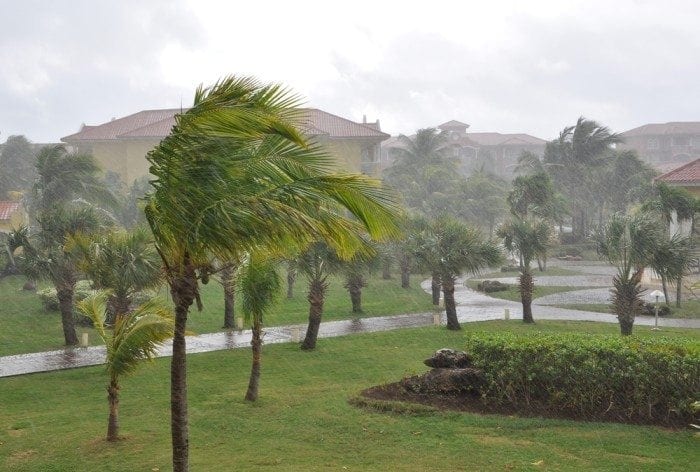8 Tips for Hurricane Preparedness if You’re Blind
Published onHurricane Preparedness for People who are Blind or Visually Impaired
Here we are at the height of hurricane season in Florida, and with the news of record breaking rainfall closing off streets and flooding Tampa, we thought it would be a great time to give some more advice on Hurricane Preparedness for individuals with low vision or blindness. August is historically one of the peak months in hurricane season, but the full Hurricane Season in Florida is officially June 1st to November 30th.

Just like it is for anyone, Hurricane Season can be a very stressful time for people living with visual impairments and that’s why it’s especially important to be prepared. As the saying goes: “it’s better to be safe than sorry,” and this holds true for Hurricanes. You should be prepared long before you ever need it and we’re going to walk you through some tips for getting ready.
Knowing what to do, being prepared, and having a plan can literally mean the difference between life and death during natural disasters.
In this post you’ll find:
- 8 Tips for Hurricane Preparedness if You’re Blind
- How to Build a Hurricane Kit, Designed for those with Visual Impairments
- A Special Note for Pets
- Additional Resources
8 Tips for Hurricane Preparedness if You’re Blind
- Create a plan, having a strategy should always come first. Figure out evacuation routes/family plans, emergency contact information, as well as who and what is going with you- do all this well in advance of the emergency.
- Have copies of your most important documentation, keep them safe in water tight containers or in ziploc bags. Putting Braille labels on things for your own sake, can help keep you organized if you need to find something in a hurry on your own. Some examples to include are: medical prescriptions and records, social security cards, birth certificates, passports, military ID’s, mortgage documents, and even proof of your current address. Just remember to keep these copies safe and secure at all times, including when it’s not Hurricane season.
- Have a network of neighbors, friends, and family that can alert you to emergencies and evacuation orders when you’re not aware. Having someone give you a warning call can give you precious extra time get out and stay safe. This network should also know how to contact you after you evacuate due to a hurricane.
- Keep the car’s gas tank full. You never know when disaster will strike, during Hurricane Season be extra vigilant in how often you and your family fill the family car up with gas. Having a full tank of gas means having one less worry during a stressful situation. You may not be driving the car, but you feel just as responsible for its passengers.
- Keep a Hurricane Kit or go-bag in the car. We’ve provided an example of what we’d pack below, but agencies like the Federal Emergency Management Agency and the Red Cross, suggest packing for what you and your family would need to survive for three days after a disaster.
- Pack an extra cane. If there’s any assistive devices that you absolutely couldn’t live without, grab these on the way out- but only if you have time! You can always replace technology, you can’t replace a life.
- Set aside and mark or label some money that you can use during an emergency. Credit and debit cards might not work, especially if the power is out. Having money set aside like this can help you keep on top of things; not having to rely on someone to tell you what denomination a bill is will also give you piece of mind.
- Make plans for your service animal as well. If you have a seeing-eye dog, think about alerting the shelter where you plan to evacuate to that you have a service dog before hand. Think about bringing food and water for your service animal too. This is also going to be a stressful time for them, so this forethought will give you both some comfort.
How to Build a Hurricane Kit, Designed for those with Visual Impairments
For this information we turned to another state’s resources for some guidance. The “Emergency Preparedness Guide For People Who Are Blind or Have Low Vision,” is a fantastic resource for preparing for general emergencies. Some of their key takeaways with additions to help the visually impaired are as follows:
- Pack three gallons of water per person, this is how much you’re supposed to drink and use for three days.
- Pack some juice that does not need to be refrigerated. If you read braille, don’t forget to slap some braille labels on the containers so they are easily accessible to you.
- Be sure to include some candy.
- Pack non-perishable foods for three days as well: things such as canned ready-to-eat goods, crackers, cereal, bread, granola, nuts, peanut butter etc. Label these in braille so that they’re accessible to you.
- Include a can opener.
- Pack a weather radio and flashlight; include extra batteries in the kit as well.
- Pack a First Aid kit. Label or organize the kit so that it’s accessible to you.
- Include toiletries; it’s easy to overlook but you’ll be glad you didn’t.
- Pack an extra assistive cane.
- If you pack these things in watertight 5-gallon buckets, they’ll be easy to store and load into the family car when needed.
A Special Note for Pets
If you have a guide dog or other service animal, please think about them during the emergency too. Packing food, water, and even toys for your service animal will help them “weather the storm” better. As mentioned above, it may help to inform your planned evacuation shelter that you have a service animal. These animals are in-tune with you and your feelings and chances are you’re also very close to them as well. Planning ahead will help you both stay calm, knowing you’re prepared should an hurricane or other natural disaster situation arise.
Additional Hurricane Preparedness Resources
The Ready.gov government website suggests preparing your home as well and we’d recommend you review their information for how to secure your property, both inside and out. For some more information on how to prepare for emergencies, please review the information on the following websites:
Categorized in: Health and Wellness, Informational, News and Events, Opinion
This post was written by




Comments are closed here.